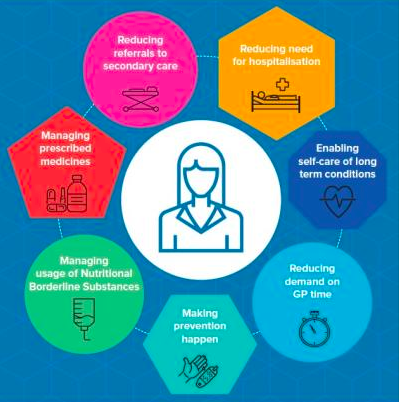What does a Dietitian do?
You may have heard of a dietitian, but do you know what they can do?
Dietitians are qualified and regulated health professionals who assess, diagnose and treat dietary and nutritional problems, across different specialisms, both at an individual and public-health level.
By using the most recent public health and scientific research on food, health and disease; dieticians translate this into practical guidance to allow people to make appropriate lifestyle and food choices.

Dietitians aren’t just limited to the NHS, they can work with people of all ages in a variety of settings.
Clinical Dietitians
Clinical dietitians work in acute hospital settings (public/private) alongside multi-disciplinary teams (consisting of doctors, nurses, physiotherapists and more!). Their work can involve consulting with in/outpatients, performing nutritional assessments and advising on nutritional therapy. They are a crucial part of the team to deliver the best care to those in hospital.
Private Practice Dietitians
These dietitians consult with private clients that need advice on nutritional management, usually to alleviate various chronic illnesses or diseases. The type of private practice can vary from general advice to a specialist area of choice!
Community Dietitians
Community dietitians see patients in a variety of community settings such as community hospitals, nursing and residential homes, clinics, community group sessions and even patients’ own homes!
Public Health Dietitians
Dietitians in this public sector can work for the government, non-governmental or non-profit organisations. They are usually involved in policy, studying public health for particular demographics and giving advice on a more universal level for the betterment of the public.
Food Service Management/Catering Dietitians
Catering dietitians are involved in the provision of healthy or specialised diets to people in particular institutions. For example, dietitians can be involved in the curation of hospital menus, prison menus and even school dinners!
Research Academic Dietitians
Dietitians work on an evidence-based foundation and conducting research is crucial! In this sector, they can undertake studies or research on various nutrition-related topics. This is a fundamental part of dietetics and helps the profession to progress further! Academic dietitians are also involved in the teaching of future dietitians through undergraduate or postgraduate degrees.
Consulting Dietitians
These dietitians generally consult to food, nutrition, healthcare and pharmaceutical industries to provide the evidence-base and expertise for products or services. Work can span from working with supermarkets, restaurants and food brands to healthcare writing, new supplements and more!
Want to Know More?
Interested about what else being a dietitian entails? The British Dietetic Association is a great place to start! The BDA is all things dietetics and is a great platform to learn more about the profession.
As Dietician’s Week has recently passed, check out all the dieticians, dietetic support workers, nutritionists and students posting about what they do through the #WhatDietitiansDo and #DW2022 hashtags on any social platform.
Remember, there is no average Dietitian. You can deliver evidence-based nutritional support to any person, of any age, in any sector you like!
